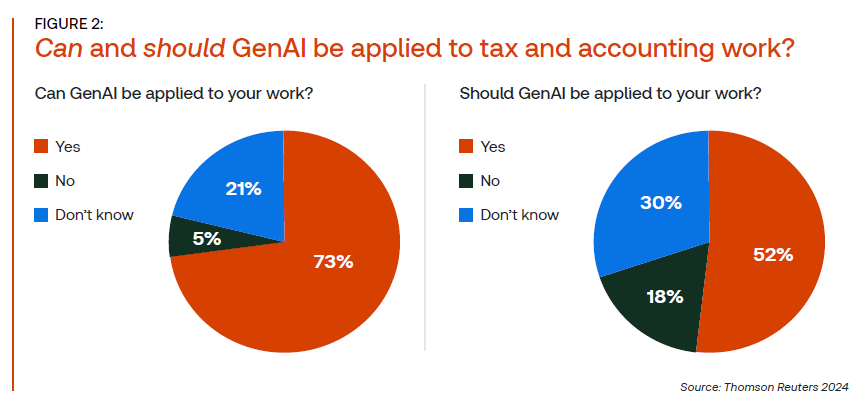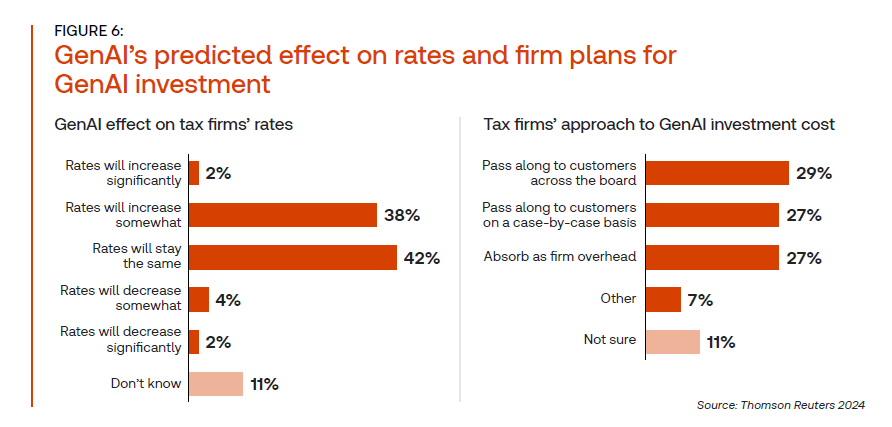A new report reveals tax & accounting firm professionals believe GenAI will be a part of their daily lives, but absent client direction, many firms have unanswered questions about business implications, GenAI policies, and training
As the technology around generative artificial intelligence (GenAI) advances, tax & accounting firms are facing an inflection point. Many tax & accounting professionals believe that GenAI will be a part of their future, with more than half saying they believe that GenAI can and should be applied to their work.
At the same time, however, many professionals and their firms have not yet explored fully using GenAI for either personal or firm-wide work, and many said that adoption is still years away. Indeed, many tax & accounting firms are still in the early stages of discerning the business implications of GenAI technology, as well as how it fits into their policies and training programs.
A new report titled 2024 Generative AI in Tax Firms from the Thomson Reuters Institute explores the current perceptions around GenAI, how it is being used in the modern tax & accounting firm workplace, and how it will influence the future of firms’ business. The report, which is based on a survey of 330 tax & accounting firm respondents, also explores what clients expect from their firms regarding GenAI use, and areas in which firms may need more investment before widespread adoption can occur.
Overall, many tax & accounting firm professionals said they feel positively about GenAI’s implementation, with nearly half (47%) saying they feel excited or hopeful, while just 17% feel concerned or fearful. From this, it’s no surprise that most believe GenAI will have an impact on the future of their professional work, with more than half saying that GenAI can and should be used for tax & accounting work.

However, those positive sentiments have not yet translated into widespread GenAI usage quite yet. Slightly more than one-quarter of tax & accounting firm respondents said they have used public-facing, open-source GenAI tools — such as ChatGPT — for their work, while even fewer (9%) have used proprietary tax-specific GenAI technologies. Although those figures are sure to rise — notably, 44% of respondents said they plan to use tax-specific GenAI technologies within the next three years — the report overall signals a tax & accounting space that is planning for the incoming GenAI evolution, but one that is hesitant to make the move.
That uncertainty also extends to business planning for how tax & accounting firms will be impacted by a GenAI-enabled future. According to the survey data, few corporate tax departments have indicated to their outside tax firms how they wish GenAI to be used. As a result, many firms are left to their own devices to plan for GenAI implementation. Currently, about an equal percentage of firm respondents said they believe GenAI will increase rates as said they believe that GenAI will not affect rates. Overall, however, many firms are planning on passing through GenAI costs to their customers, according to survey respondents.

As tax & accounting firms plan for a GenAI-enabled future, the report reveals that those firms will likely need to adjust their training and technology usage policies as well. Just 14% of professionals said their firms provide GenAI training, while even fewer said their firms have an AI use policy. Many are also still trying to discern exactly where GenAI will fit into their everyday workflows, with respondents mentioning a number of different use cases that they’re eyeing for initial implementation.
Ultimately, GenAI is set to make an impact on tax & accounting firms, both in short-term initial adoption and through longer-term business and client planning. However, today’s firm leaders still have some work to do in order to successfully plan for what the GenAI-enabled workplace will mean to their own organizations.







